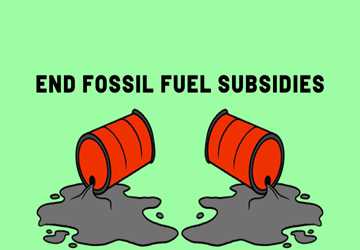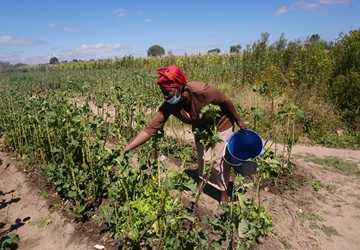Climate change is first and foremost a development issue. It could slow economic growth and exacerbate poverty. Notably, the development of countries and their efforts to meet the energy, water and food needs of growing populations could contribute to climate change and increase or help mitigate global threats.
The economy must continue to expand; stopping now would be fatal. We must find a way to reduce emissions without slowing economic expansion.
Make carbon expensive.
To reduce emissions, a strong political signal must first be sent.
By incentivizing companies to adopt pollution-reducing practices and increase spending on renewable energy and low-carbon innovations, carbon pricing schemes (such as emissions trading schemes that limit emissions or taxes collected per ton) send strong long-term signals.
Nearly 40 countries and more than 20 cities, states and provinces have introduced or are developing carbon pricing through carbon taxes or emissions trading programs.

Stop fuel subsidies
When governments subsidize fossil fuels, it sends a message that waste is acceptable and slows the transition to a low-carbon economy. Removing inefficient and wasteful fossil fuel subsidies would allow governments to reallocate funds to areas of greatest need, such as helping those in need more directly.
Subsidy reform is difficult to implement. However, since most people do not know what the true cost of electricity is, it is necessary to increase aid to the poor as subsidies are gradually reduced.
Create carbon neutral, highly resilient urban areas.
Part of the solution is identifying the correct tariffs. In addition, as climate change affects overall growth, building a green future is also important.
Currently, more than half of the world's population lives in cities; by 2050, this number is expected to increase to two-thirds.
Cities should avoid adapting to unsustainable practices by planning for land use and transportation and implementing energy efficiency standards. As such, they can potentially reduce the impact of air pollution and increase economic opportunities for disadvantaged groups.
Increase renewable energy consumption and energy conservation.
Accessibility is a key issue when it comes to energy. Some 1.2 billion people lack access to electricity, and 2.8 billion use solid fuels such as charcoal, wood and coal for cooking, driving dangerous levels of indoor air pollution.
Improving energy efficiency is critical. If we use less energy, we must produce less. Over the past 20 years, improvements in energy efficiency have reduced global energy consumption by nearly a third.
At the same time, the cost of renewable energy is falling. In many countries, creating large renewable energy utilities is competitively priced, even cheaper than building fossil fuel power plants.

Promote more climate-resilient agriculture and protect forest habitats.
The fifth area of action combines adaptation and mitigation. For example, through climate-friendly agricultural practices, farmers can increase farm yields and withstand the effects of climate change such as droughts, while building carbon sinks that contribute to net emissions reductions. Like other beneficial carbon sinks, forests act as carbon sinks by capturing and storing gases in their roots, trees and leaves.
For this reason, it is critical to integrate resilience-building strategies into all aspects of development and allocate more resources to prevention and preparedness.


